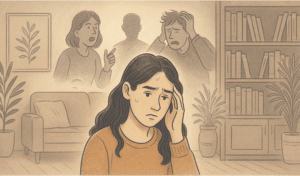In 2013, studies found that over 40% of college students experienced anxiety and over 35% experienced depression. A later study, conducted in 2018, found that 1 in 5 college students considered suicide as a way to escape their stressors.
An estimated 1,000 students die by suicide on college campuses each year. This does not account for the students who die by suicide while they are off-campus.
Together, we can work to reduce the number of deaths by suicide in college. Understanding what leads to suicide in college and shifting our values as a society are the first steps we can take to help.
Read on to find out more about the pressures college students deal with, what we can do to help people in need, and the treatments that are available.
What is Making College Students So Stressed?
A lot of changes happen at once when students go to college. For many of them, it is their first experience living away from a parent. They are meeting all new people, taking more difficult courses, and learning the importance of self-motivation.
College is a crash course in balancing obligations like schoolwork with social life, sleep, and personal health. You’ll often hear college students joking that of those four things, you can pick three…or even two.
In case that isn’t stressful enough, a large number of college students are employed in addition to taking classes. In 2017, 43% of fulltime students and 81% of parttime students were working while enrolled in school. Students who also have work obligations have even more to balance in terms of time management and they are learning the difficulty of financial responsibility.
All of these things are enough to stress anyone out, regardless of their previous state of mental health. Let’s talk a bit about the values these students are taught by society that turn up the heat on their anxiety and depression even further.
What Our Society Values
Part of the pressure college students feel likely comes from the values our society deems most important. We live in a world that emphasizes competition as a way to succeed. Students are constantly reminded that they need to excel in school in order to excel in a job after graduation.
At the same time, college students these days are bombarded with talk of a job market that doesn’t have room for them. The issue is not unemployment, but rather underemployment, a term that refers to working in a field that is below one’s qualifications. In 2018, 43% of recent college graduates fell into the category of underemployment.
How is a college student supposed to cope with the pressure of finding a job their peers and family will deem “worthy” when they know the odds aren’t great? It can be hard to escape the feeling that trying to succeed is futile while also being unable to escape the feeling that financial success is the most important accomplishment in life.
On top of that, young adults may feel very alone in their anxiety and depression. They may feel that admitting to these negative feelings and thoughts is the same thing as admitting to failure, and so they try to work through it all on their own.
How Can We Shift Our Values to Prevent Suicide in College?
It’s important that we teach young adults the value of self-care and make mental health a priority in life, not something that goes by the wayside on the quest for success.
Ultimately, nothing is more important than a life. Good grades aren’t worth a life, high-paying jobs aren’t worth a life, and finishing a degree in four years or less is not worth a life. Young adults need to be shown that when their mental health is in turmoil, they need to step back from school and work and focus on themselves.
This isn’t something they need or even should do alone. We need to redefine the step of asking for help as a sign of strength, rather than a sign of weakness or defeat. We should encourage openness in relationships and foster healthy connections.
Valuing emotional openness, honesty, and self-care are great ways to show young adults that not everyone expects them to stay on the “work grind” constantly.
What Treatments Can Prevent Suicide in College?
In order to promote self-care, we need to give young adults the proper resources to practice it. This is especially important for college students who have been dealing with severe enough depression and anxiety to consider suicide an option.
Colleges, themselves, need to provide on-campus resources that are easily accessible. Free counseling for students and group activities that allow for self-expression are a great place to start. It may be important to factor mental health into courseloads and due dates, allowing more room for students to take breaks or slow their pace when they need to.
The family and friends of an individual experiencing anxiety and depression should do their best to support that individual. In many cases, this may entail active listening and simply being there.
In more severe cases, this may entail more serious action. For individuals with severe mental health problems that may be a danger to themselves, seek professional intervention. These individuals may need assistance ranging from increased therapy sessions to admittance to an in-patient program designed to cope with depression.
Once again, seeking help–and that includes professional help–is not admitting defeat. It’s allowing oneself the room and respect to heal and grow.
Say No to Silence
If you or someone you love are contemplating suicide in college or at any stage in life, speak up about it.
Too often, we stay silent about mental health out of a fear of judgment, failure, or being burdensome. Remember that these fears are rooted in harmful values and that speaking up can save lives.
At A Mission for Michael, we focus all of our energy on helping our clients to learn new coping mechanisms, find the right balance of medication, and remember how to value themselves. For more information about our programs, contact us today.







